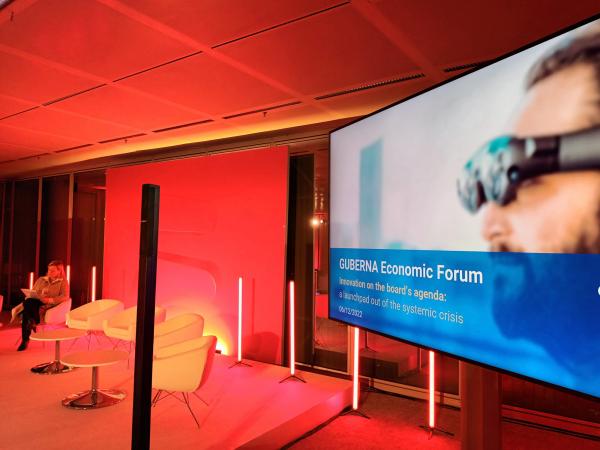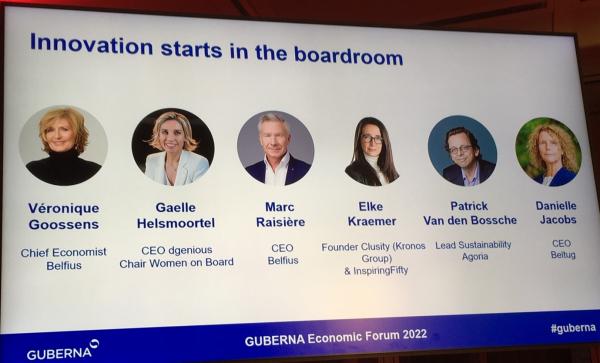Innovation on the Board's agenda - A report of the GUBERNA Economic Forum 2023

Het GUBERNA Economic Forum 2022 stond dit jaar in het licht van hoe het thema van innovatie op de agenda van de raden van bestuur staat: “Innovation on the board’s agenda - a launchpad out of the systemic crisis”.
Chris Sunt, Chairman van de Board of Directors van Belfius, leidt de avond in. Hij benadrukt dat de succesvolle herlancering van Belfius in 2012 niet alleen dankzij de samenwerking met alle belanghebbenden was, zowel met alle interne Belfius medewerkers als het netwerk van externe agenten en alle aandeelhouders tot alle Belfius klanten, maar ook dankzij een strikte naleving van de principes van goed bestuur. Dat bestuur plaatste steevast innovatie centraal op haar agenda, en tekende daarmee de krijtlijnen uit waar het management mee aan de slag kon.
Corporate governance is meer dan risicobeheersing en compliance
Liesbeth De Ridder, Secretaris Generaal van GUBERNA, schetst vervolgens de bredere context van het Innovatiethema. Bestuurders worden geconfronteerd met grote uitdagingen. Er is de inflatieopstoot, de oorlog in Ukraine, de energiecrisis, en dit alles tegen de achtergrond van de aanzwellende gevolgen van klimaatverandering. Omdat innovatie een van de middelen is om het hoofd te bieden aan deze uitdagingen, moet corporate governance meer zijn dan enkel risicobeheersing en compliance. Liesbeth verwijst naar de bijdrage van Prof. dr. Abigail Levrau aan de in oktober 2022 gepubliceerde ecoDa white paper “Innovation: Is The Eu Corporate Governance Framework Fit For Purpose?”. De belangrijkste innovatiedomeinen die daarin worden geïdentificeerd zijn digitalisering, business ecosystemen, kwaliteitsvolle informatie, een gepast regulerend kader dat zuurstof en speelruimte geeft aan innovatie binnen ondernemingen, en het overkoepelend belang van ESG. Goed bestuur dat investeert in innovatie op deze domeinen kan de meeste opportuniteiten en toegevoegde waarde creëren.
Economische uitdagingen
Marianne Collin, Chief Risk Officer van Belfius, geeft in haar keynote een overzicht van de belangrijkste economische uitdagingen die op ons afkomen. Ze beschrijft de verscheidene shocks van de afgelopen jaren, waaronder de grote financiële crisis van 2008-2009, de Europese schuldencrisis van 2010-2011, Brexit in 2016, de Covid-19 pandemie, tot en met de oorlog in Ukraïne dit jaar. Alhoewel de economische impact van deze shocks steeds deels werd opgevangen door de drie factoren van een gul monetair beleid van de Europese Centrale Bank, expansieve fiscale uitgaven van de EU lidstaten, en structurele verbeteringen in de private sectoren, worden we voor het eerst in jaren geconfronteerd met een verontrustend sterke inflatieopstoot. Collin verwacht dat de inflatie het komende jaar moeilijk zal kunnen zakken onder de 6 à 7% door een samenloop van drie factoren: de recente deglobalisering van handelsstromen, de demografische druk van een verouderende bevolking, en de investeringen voor decarbonisering.
Dit alles kan een negatieve impact hebben op de concurrentiepositie van Europa en België. De Belgische economie is tot nog toe weerbaar gebleken tegen deze shocks, maar het risico bestaat dat de markten België met haar hoge staatschuld plots bestraffen—analoog aan de paniek die de Britse regering recent veroorzaakte in de schuldmarkten met een onevenwichtig begrotingsplan.

Kwaliteit en diversiteit in bestuursraden
Het daaropvolgende panelgesprek wordt gemodereerd door Véronique Goossens, Chief Economist bij Belfius. Ze voert een gesprek met Gaelle Helsmoortel (CEO dgenious en Chair Women on Board), Marc Raisière (CEO Belfius), Elke Kraemer (Founder van Clusity en InspiringFifty), Patrick Van den Bossche (Lead Sustainability Agoria) en Danielle Jacobs (CEO Beltug).
Op de vraag of we ons moeten zorgen maken of er voldoende kwaliteit en diversiteit in onze bestuursraden zit, benadrukt Gaelle Helsmoortel dat een board zich eerst de vraag moet stellen welke de noden van de organisatie zijn, en op basis daarvan diverse profielen aanstellen in haar raad. Danielle Jacobs sluit zich aan bij de observatie dat er nog teveel raden van bestuur zijn met enkel financiële profielen, waardoor de opportuniteiten die nieuwe technologieën bieden te vaak verwaarloosd worden of ongekend zijn. Elke Kraemer voegt daar aan toe dat een diverse raad moet adviseren, luisteren en gids zijn van het begin van het innovatietraject bij de formulering van KPIs tot het einde van het traject waar men kijkt of de KPIs behaald zijn.

“Innovatie zonder ambitie is nonsens.”
Marc Raisière stelt dat innovatie op zich nog niet de oplossing of een doel op zich is: “Innovatie zonder ambitie is nonsens.” We hebben veel hoogopgeleide mensen in België, maar deze worden vaak niet uitgedaagd—ook niet door hun bestuurders—tot ambitieuze voorstellen en plannen. Patrick Van den Bossche voegt daar aan toe dat er bij technologische innovatie nog te vaak enkel word gekeken naar de schade die een nieuwe technologie zou kunnen veroorzaken, en te weinig naar de opportuniteiten die de nieuwe technologieën kunnen bieden. Belgische bedrijven kunnen van de nood een deugd maken, als ze onze grondstofarmoede en hoge loonkost counteren door op een zo efficiënt mogelijke manier om te gaan met de grondstoffen.
Innovatie begint bij bewustwording, en bij wijze van bewustmaking stelt Patrick Van den Bossche voor om de risico’s geidentificeerd door het World Economic Forum standaard op de agenda van alle bestuursraden doorheen het jaar te plaatsen om deze steeds op het voorplan te houden. Bestuurders moeten zich volgens Elke Kraemer ook bewuster worden van het feit dat alhoewel bestuursraden diverser zijn geworden, er in de technologiesector nog veel werk aan de winkel is om ook op managementgeledingen een betere doorstroming van diverser (gender)profielen mogelijk te maken. Tenslotte stipt Danielle Jacobs aan dat bestuurders zich veel bewuster moeten worden van de internationale dimensie. Zo zal het vermijden van afhankelijkheid van niet-Europese cloudplatformen de komende jaren steeds hoger op de agenda komen te staan.
Een ambitieuze agenda
GUBERNA’s Economic Forum 2022 gaf de aanwezigen niet alleen een grondig overzicht van de uitdagingen die op de Belgische bestuurders afkomen, maar tegelijk een ambitieuze agenda voor de komende jaren om aan deze uitdagingen het hoofd te bieden. Belgische bedrijven hebben de expertise en ervaring om met innovaties voor de dag te komen die onze zwaktes ombuigen in sterktes en opportuniteiten.
